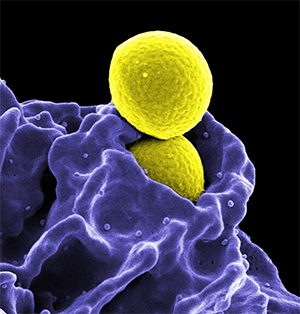
Charmaine N. Nganje, PREP scholar at Tufts University in Boston.
Credit: Katherine Suarez.
Charmaine N. Nganje
Hometown: Montgomery Village, Maryland
Influential book : The Harry Potter series (not exactly influential, but they’re my favorite)
Favorite movie/TV show: The Pursuit of Happyness/The Flash
Languages: English (and a bit of Patois)
Unusual fact: I’m the biggest Philadelphia Eagles fan from Maryland that you’ll ever meet
Hobbies: Off-peak traveling
Q. Which NIGMS program are you involved with?
A. The Postbaccalaureate Research Education Program (PREP) ![]() at the Sackler School of Graduate Biomedical Sciences at Tufts University in Boston.
at the Sackler School of Graduate Biomedical Sciences at Tufts University in Boston.
Q. What got you interested in science?
A. I’ve always loved science. I loved being outside and had a natural curiosity to understand how things worked in and around us. I went to and participated in every science fair I could. I know I probably annoyed my mom with all my questions.
“Staining cells during lab almost felt like art class.”
After a rough sophomore year in college, I was starting to think science wasn’t the route for me anymore. Luckily, I enrolled in a microbiology class the following year, which sparked my interest in research and my curiosity for science. This class was both fun and intellectually stimulating. Staining cells during lab almost felt like art class.
After taking this course, I wanted to learn more about microbes, so I worked as an undergraduate researcher in the bacterial pathogenesis lab of my instructor, Dr. Mara Shainheit.
I was fortunate enough to pick a project based on my own interests. Our project involved studying the interactions between bacteria and their host. My mentor inspired me to pursue a career in research, specifically studying host pathogenesis, or how our bodies can do more harm than good in response to infections.
Q. What research are you currently conducting at Tufts University?
 White blood cells called neutrophils protect our bodies from infection by recognizing and destroying disease-causing bacteria. In this microscopy image, a neutrophil (shown in violet) is ingesting MRSA (methicillin-resistant, Staphylococcus aureus) bacteria, shown in yellow.
White blood cells called neutrophils protect our bodies from infection by recognizing and destroying disease-causing bacteria. In this microscopy image, a neutrophil (shown in violet) is ingesting MRSA (methicillin-resistant, Staphylococcus aureus) bacteria, shown in yellow.Credit: National Institute of Allergy and Infectious Diseases.
A. I’m lucky that I’m able to continue studying infectious diseases and how the immune system responds to disease-causing bacteria. I’m working with two scientists, Dr. Joan Mecsas and Dr. John Leong, to understand why people become more susceptible to bacterial diseases as they get older.
I’m particularly interested in a type of white blood cell called a neutrophil, which acts as a sort of “first responder” in the immune system. There are billions of neutrophils circulating throughout our bodies, attempting to destroy the bacteria that make us sick. I’m interested in discovering how the antimicrobial functions of neutrophils change as we age.
Q. What are your future plans as you approach the end of PREP at Tufts?
A. I’m focused and determined to pursue a Ph.D. in immunology, and I’ve applied to graduate programs in the Boston area. Everything the PREP program has provided, including the mentorship, workshops, and career panels, have solidified my decision. The program has helped me build confidence and learn essential skills to become an independent scientist. In the future, I’d like to use the knowledge I’ve gained through studying host-pathogen interactions to develop and enhance therapeutics.
Q. What motivates you to continue in this field?
“As long as I’m contributing new knowledge, I’ll remain curious and excited every day.”
A. Research is hard. You work long hours and sometimes—most of the time—things don’t work as expected. I’ve always known that I wanted to help people, and that’s what motivates me. Every day at the bench or under the tissue culture hood helps paint a clearer picture of how our immune system defends us from countless pathogens. As long as I’m contributing new knowledge, I’ll remain curious and excited every day.


Dear Charmaine , congratulations for such a wonderful plans for the future . Respectfully suggest please think about : How prenatal Diet/ Nutrition can influence, impact the Gastrointestinal tract especially the lymphoid tissue and the Microbiome and subse quently the Immunogenetics and CELLULAR IMMUNITY of Human being . Thank you , Arnold Vera, MD., MSc., CDE., FACE